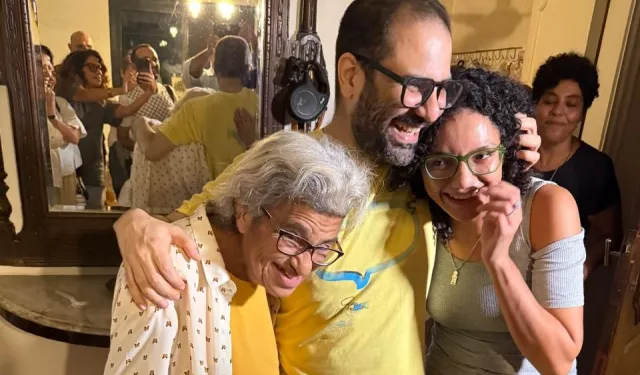In the early hours of Tuesday, Egyptian authorities released political activist Alaa Abdel Fattah whose detention for nearly a decade became a symbol of Egypt’s crackdown on dissent. The release of the Egyptian-British writer, blogger, and software developer follows a presidential pardon issued by President Abdel Fattah El-Sisi on Monday, after sustained international and domestic appeals.
Abdel Fattah’s family had rushed to Wadi Al-Natrun prison after the decree was announced, expecting to greet Alaa there. Instead, they received a call from him in the middle of the night telling them that he was already home, without his key. The family quickly returned to their residence in Dokki, where they were joined by friends and relatives in an impromptu celebration.
At home, Alaa told those present that he only learned of the pardon at 7:30 pm Monday, by chance, through a news ticker on television. He said he had received no formal or informal notice, and had no idea his family had been waiting outside the prison.
British Foreign Secretary Yvette Cooper welcomed the news, “I thank President Sisi for this decision. We look forward to Alaa’s return to the United Kingdom,” she wrote on X.
Human Rights Watch also welcomed the pardon. Amr Magdi, a researcher in the Middle East and North Africa division, called it “long overdue good news.” He stressed that while celebrations for Alaa's release are in order, “thousands like him remain imprisoned in Egypt for simply exercising their right to free expression. We hope this marks a turning point, and a chance for President Sisi’s government to end the unlawful detention of peaceful critics.”
Others granted clemency alongside Abdel Fattah include Said Megalli El-Daw Aliwa, Karam Abdel-Sami Ismail El-Saadani, Walaa Gamal Saad Mohamed, Mohamed Abdel-Khaleq Abdel-Aziz Abdel-Latif, and Mansour Abdel-Gaber Ali Abdel-Razek.
On Sept. 9, President El-Sisi had instructed relevant authorities to review a petition from the National Council for Human Rights, which had appealed for a presidential pardon on humanitarian grounds. The council cited family hardship and deteriorating health of detainees, including Abdel Fattah.
Following this, Abdel Fattah ended a hunger strike he began on Sept. 1, protesting the state’s refusal to release him despite the removal of his name from Egypt’s terrorism list.
His release had initially been expected at the end of September 2024, according to his lawyer Khaled Ali, who previously said authorities refused to count his pretrial detention toward his sentence. The five-year sentence was handed down by an Emergency State Security Court and ratified by a military governor on Jan. 3, 2022.
Abdel Fattah was arrested on Sept. 28, 2019, and convicted of charges including “publishing and broadcasting false news inside and outside the country,” “misusing social media platforms,” “joining a terrorist organization with knowledge of its goals,” and “founding a group in violation of the law.” He was sentenced to five years in December 2021, after spending more than two years in pretrial detention.
A software developer, writer, and veteran of the 2011 revolution, Abdel Fattah’s imprisonment drew widespread international criticism and became a flashpoint in UK-Egypt diplomatic relations.
